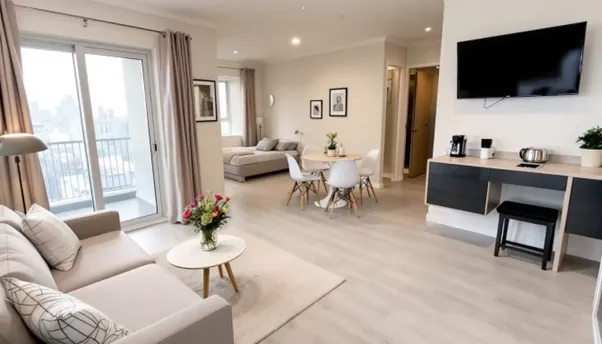Key Insights
Here are some of the key insights of our guide to becoming a student landlord.
- Renting to students offers consistent demand in university areas, predictable tenancy turnover, and the potential for higher rental yields through room-by-room agreements.
- Challenges include increased wear and tear, late payment risks, and noise complaints, necessitating proactive management and clear communication with tenants.
- Key legal considerations involve understanding HMO regulations, crafting effective tenancy agreements, and ensuring compliance with local authority rules to protect your investment.
Benefits of Renting to Students
Renting to students presents numerous benefits for landlords. The steady demand in university cities ensures minimal property vacancies, while the predictable tenancy turnover aligns with the academic calendar, facilitating strategic planning. There are more than 2.86 million university students in the UK!
Moreover, renting by room has the potential to substantially increase rental income.
Consistent Demand in University Cities
University cities are vibrant hubs where the demand for student accommodation is consistently high. With the number of 18-year-olds accepted to university or college up 2.9% in 2024, the need for student properties is only growing. This high demand means that student landlords often enjoy fewer void periods compared to other rental types, ensuring a steady stream of rental income.
Students typically start searching for housing as early as November for the next academic year, giving landlords plenty of time to market their properties and secure tenants. Working with university accommodation offices can also boost visibility and connect landlords with students looking for student lettings.
Tying this knowledge in with your marketing strategy keeps your purpose-built student accommodation in high demand.
Predictable Tenancy Turnover
A major advantage of renting to students is predictable tenancy turnover. The academic calendar sets tenant timelines, resulting in consistent move-in and move-out dates. This regularity enables landlords to plan maintenance and marketing activities efficiently, keeping the property in top condition and appealing to new tenants.
A clear turnover schedule allows landlords to create targeted marketing strategies before peak rental seasons. This proactive approach aids in promptly finding tenants and scheduling necessary repairs during offseason when the property might be vacant. Such predictability is invaluable for student landlords.
Higher Rental Yields
Renting by room, rather than traditional agreements, allows landlords to accommodate more tenants, significantly boosting overall rental income. Charging rent per room usually results in higher yields, making it a lucrative option for many student landlords.
This strategy maximises rental income and offers flexibility in setting rates based on room size and amenities. Capitalising on high demand and room rentals, landlords can achieve impressive returns, making the student rental market attractive.
Challenges of Renting to Students
![Man sitting at a desk with two laptops, holding a mug, surrounded by papers and documents, appearing concerned.]()
Despite the benefits, renting to students also comes with challenges. Increased wear and tear, the risk of late payments, and noise or anti-social behaviour are common concerns for student landlords.
Proactively addressing these issues can ensure a successful and smooth rental experience.
Increased Wear and Tear
Renting to students often leads to increased wear and tear. Frequent tenant turnover results in varying levels of care, necessitating higher maintenance and repairs. Common causes include gatherings, accidents, and inexperience in property upkeep.
Students’ lifestyle choices, like hosting parties, can add to wear and tear, requiring regular upkeep. Preparing for these challenges and promptly addressing maintenance can help keep the property in good condition.
Risk of Late Payments
Financial stability can be a concern due to students’ reliance on parental support or loans. Landlords often require a guarantor to ensure rent payment.
High upfront costs and advance deposits can affect students’ affordability, potentially causing late payments. Students without a UK-based guarantor may also face complications in securing a lease.
Landlords, including private landlords, should set clear rental criteria and communicate expectations to mitigate these risks.
Noise and Anti-social Behaviour
Noise levels and anti-social behaviour are frequent concerns for student landlords. Common noise sources include parties, loud music, and gatherings. Ignoring these issues can lead to tenant dissatisfaction and complaints to authorities.
Clear communication and setting noise expectations can help minimise conflicts. Regular inspections and promptly addressing tenant concerns also play significant roles in managing noise and maintaining a positive relationship.
Legal Considerations for Student Landlords
Navigating the legal landscape is vital for student landlords. Understanding HMO regulations, creating comprehensive tenancy agreements, and complying with local authority rules are key steps to ensure legal compliance and protect your investment.
Understanding Student HMO Regulations
A property is usually classed as an HMO if occupied by three or more individuals, forming more than one household. Renting to five or more tenants usually requires an HMO license, so landlords must understand and comply with local council regulations.
Overcrowding in HMOs can lead to criminal charges if regulations are violated. Therefore, landlords must ensure properties meet required standards and address tenant complaints promptly. Read more about HMOs.
Creating a Student Tenancy Agreement
A well-crafted student tenancy agreement is essential for a smooth rental experience. It should clearly outline responsibilities for both landlord and tenants, including regular property inspections. Guarantor agreements are often required to ensure rent payment.
Scheduled inspections in the tenancy agreement help maintain the property and establish a routine. Clear communication about repairs and maintenance should be documented to ensure accountability.
Compliance with Local Authority Rules
Compliance with local authority rules is crucial to avoid fines and maintain benefits like council tax exemptions. Landlords must inform local councils when properties are occupied by students and properly register tenant status.
Non-compliance can result in loss of tax exemptions and other penalties. Landlords should stay informed about local requirements and ensure properties meet all standards.
Preparing Your Property for Student Tenants
![Modern open-plan apartment with a living area, dining table, bed, balcony, and wall-mounted TV.]()
Preparing your property to meet student tenants’ expectations is crucial for a successful rental experience. This might include fully furnishing the property, ensuring fire safety, and offering all-inclusive bills to attract and retain tenants.
Fully Furnishing the Property
Fully furnishing rental properties is key to most student rentals since students typically don’t own furniture. Basic items like beds, desks, chairs, and kitchen essentials are expected. Providing a fully furnished property can make it more appealing and convenient for student tenants.
Landlords should also consider the durability and functionality of provided furniture and appliances. Investing in quality items can reduce frequent replacements and keep the property attractive.
Ensuring Fire Safety
Fire safety is crucial in student rental properties. Landlords must comply with fire safety regulations, including installing smoke alarms and carbon monoxide detectors. These measures protect tenants and the property, minimising fire risks.
Regular inspections should check fire safety equipment to ensure it’s working. Compliance with fire safety regulations safeguards tenants and protects landlords from legal repercussions.
Offering All-inclusive Bills
Offering all-inclusive bills can make rental properties more appealing to students who value budget certainty. Including utilities in rental agreements simplifies financial management and helps tenants avoid unexpected costs.
This approach also reduces the administrative burden for landlords, as they manage utility payments directly. Offering all-inclusive bills can attract more tenants and ensure a smoother rental experience.
Marketing Your Student Accommodation
![Smiling man in a cap sits at a desk with papers, coffee, and laptops, gesturing with both hands in a bright office.]()
Effective marketing is crucial to attract student tenants. Understanding their preferences and using various marketing channels can enhance the visibility and appeal of your rental properties.
Here are some strategies for marketing through university accommodation offices and online platforms, plus some key selling points.
Utilising University Accommodation Offices
Collaborating with university accommodation offices can expand your reach to students actively seeking housing. These offices are valuable resources for connecting landlords with student renters, enhancing visibility and direct connections.
These offices can also offer valuable insights into student preferences and housing trends, helping landlords tailor their offerings to meet market needs.
Online Platforms and Social Media
Using online platforms and social media is crucial for advertising your rental property to students. Online rental portals can reach a wider audience quickly and efficiently, making it easier to attract potential tenants.
Social media platforms like Facebook, Instagram, and X are also powerful tools for marketing. Engaging content and showcasing unique features can capture prospective tenants’ attention and increase inquiries.
Highlighting Key Selling Points
Showcasing unique features and community life in advertisements can attract student interest. Highlighting modern furnishings, high-speed internet, and proximity to campus can set your property apart. Emphasising these aspects can appeal to students seeking convenience and comfort.
Including photos and virtual tours can give prospective tenants a clear idea of what to expect. Highlighting community sense and amenities like study areas or social spaces can further enhance the property’s appeal.
Managing the Student-Landlord Relationship
Effectively managing the student-landlord relationship is crucial for a successful rental experience. This involves open communication, regular property inspections, and promptly handling tenant issues.
These practices help build trust and ensure a positive relationship with student tenants.
Effective Communication Strategies
Open communication with student tenants is essential, especially for those new to tenancy responsibilities. Regular communication and feedback can address issues before they escalate. A welcome pack with essential information can serve as a handy reference throughout their tenancy.
Promptly addressing concerns prevents minor issues from escalating. Establishing a reliable communication channel, like email or a dedicated phone line, ensures tenants feel supported and valued, fostering a positive relationship.
Conducting Regular Property Inspections
Regular property inspections are essential for monitoring condition and identifying issues before they become significant. This proactive approach helps maintain the property and ensures it remains appealing to future tenants.
Student tenants often contribute to increased wear and tear due to frequent turnover and active lifestyles. Promptly addressing maintenance needs can prevent more significant problems, ensuring the student property remains in good condition.
Handling Tenant Issues
Common issues landlords face with student rentals include property wear and tear, noise complaints, and potential for late rent payments. Maintaining open lines of communication with tenants is vital for addressing these issues promptly and effectively.
Conducting regular property inspections allows landlords to monitor property condition and address maintenance needs proactively. Building a positive relationship with student tenants can lead to smoother tenancies and help reduce conflicts over time.
Protecting Your Student Investment with Insurance
![Older man reviews paperwork at a cluttered table with a laptop, coffee, and documents in a home setting.]()
Protecting your investment with the right insurance coverage is crucial when renting to students. Understanding the specific aspects of student landlord insurance and comparing options can safeguard your property against potential risks and liabilities.
Understanding Student Landlord Insurance
Standard landlord insurance may not cover properties rented to students, highlighting the need for specific student landlord insurance.
This type of insurance typically includes coverage for accidental damage caused by tenants and malicious damage from disgruntled tenants. Property owner’s liability insurance is also often part of student landlord insurance, safeguarding landlords if tenants are injured due to property defects.
Extended unoccupancy cover is essential in student landlord insurance to protect properties during tenant holidays. Having the right insurance coverage can prevent significant financial loss in case of damage or liability issues during tenancies.
At Protect My Let, we offer comprehensive student landlord insurance to make sure you’re covered should the worst happen to your student let.
Comparing Insurance Options
When comparing insurance policies, consider factors like coverage for loss of rent and unoccupied properties to find the most suitable cover for student rentals. Consulting an insurance broker can provide tailored advice when selecting the best student landlord insurance policy.
Insuring all your properties on one policy can also simplify management and potentially reduce cost. Comparing different policies and understanding the specific coverage options can help you make an informed decision that best protects your investment.
Summary
In conclusion, becoming a student landlord offers numerous benefits, including consistent demand, predictable tenancy turnover, and higher rental yields. However, it also comes with challenges such as increased property wear and tear, potential late payments, and noise issues.
By understanding legal considerations, preparing your property, marketing effectively, managing relationships, and protecting your investment with the right insurance, you can navigate the student rental market successfully.
Embrace the journey and make informed decisions to maximise your rental income and ensure a positive experience for both you and your tenants.





